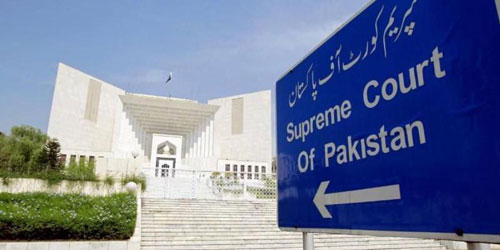The incumbent coalition government requested the Supreme Court on Thursday to dismiss Pakistan Tehreek-e-Insaf chief Imran Khan’s petition against the amendments made to the National Accountability Ordinance.
The government submitted a preliminary response to the apex court wherein it requested the court to dismiss the petition and objected to its admissibility.
The SC during the hearing issued notices to the federal government over the petition.
The government, in its reply, stated that the petition raised a political issue of public importance, not a legal one.
It also claimed that “the petition does not articulate in clear and unambiguous terms how any provisions of the Amendment Act are repugnant to any of the provisions of the Constitution”, and was of “ambiguous nature”.
The preliminary response further stated that the former premier was not the party affected by the NAB amendments nor was his application in good faith. It highlighted that the SC had declared that it would not interfere in political matters.
According to the government’s response, Imran Khan himself had been making similar amendments during his reign through ordinances.
“The Petitioner lacks both locus standi and bona fide. Amendments of similar nature were made, through Ordinances, in the National Accountability Ordinance, 1999 during the Petitioner’s term as the Prime Minister of Pakistan. It is, thus, clear that this petition does not raise constitutional but political questions,” it stated.
The government maintained that Imran had challenged the NAB amendments on Islamic grounds. However, it is the Federal Shariat Court that has the jurisdiction to declare amendments against Sharia law. They added that the NAB amendments could not be nulled on general charges.
“This petition is not maintainable. It does not raise any question of public importance with reference to any of the Fundamental Rights,” it further said.
In response, it was said that “the conduct of NAB has led to repeated contraventions of fundamental rights of citizens. It has paralysed the government machinery. It has caused economic uncertainty. Foreign direct investment in the country has contracted. Multinational companies have been harassed”.
The government highlighted the “urgent need to amend the NAO, 1999 in order to bring it in line with the judgments of this Honorable Court and also to curb misuse of authority by and the discretion of NAB”.
It added that under the Imran Khan government “various amendments were introduced in NAO, 1999 through promulgation of five Ordinances” and that “the President did not raise any objection to the advice of the then prime minister before promulgating these Amendment Ordinances”.
Earlier, Imran Khan’s petition against the amendments in the NAB Act was heard by an apex court bench headed by Chief Justice Umar Ata Bandial, and comprising Justice Ijazul Ahsan and Justice Mansoor Ali.
Federal counsel Makhdoom Ali Khan pleaded with the court that the amended petition had been submitted, it would be better to notify him so that a reply would also come. The court also accepted Imran Khan’s request for preliminary hearing against the new amendments.
Imran’s lawyer Khawaja Harris told the court in the preliminary arguments that it was impossible to prove the crime of assets in excess of income. After the amendment, action can only be taken on proving assets from corruption money.
The CJP remarked that it was a fact that people do not declare full assets and income in tax returns, to which Imran Khan’s lawyer said that non-disclosure of income or assets is not a crime under NAB law, and that undisclosed income does not have to be illegal.
Later, the court issued a notice to the federal government on Imran Khan’s amended application and adjourned the hearing of the case till the last week of September.










